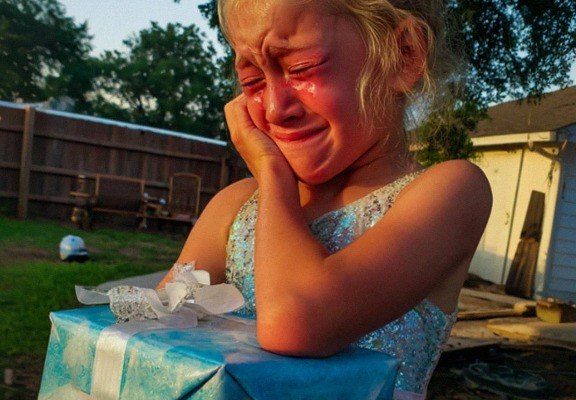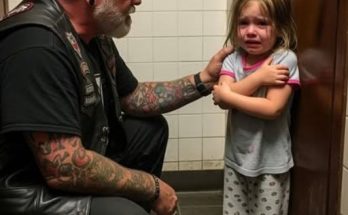When my daughter was left humiliated at a family gathering, everything I had quietly tolerated for years fell apart. What followed was a moment of reckoning built on love, loyalty, and a promise I made to myself: no one gets to tell my child she doesn’t belong.
When I met my husband, Daniel, I was 28, divorced, and already a mom.
My little girl, Ellie, had just turned two when I first brought her along on a date. I didn’t have money for a sitter, but I also wanted to know right away if this man could accept all of me, including my daughter.
Many men had pretended before—forced smiles, halfhearted high-fives—but Daniel was different. He knelt down to Ellie’s level, asked about her bunny socks, and spent nearly twenty minutes helping her glue sequins onto paper while I ate cold fries and just watched.
Two years later, Daniel and I married in a small ceremony. Ellie wore a flower crown and insisted on walking down the aisle holding both our hands. During the reception, she gave a cupcake-filled “speech” and called him her “almost-daddy.” Daniel’s eyes filled with tears.
On Ellie’s fifth birthday, he legally adopted her. We threw a backyard party with lanterns and cake. After opening gifts, Ellie climbed into his lap and whispered, “Can I call you Daddy now, for real?” He smiled and answered, “Only if I can call you my daughter forever.”
I thought that moment sealed everything—that love had healed the wounds of divorce and abandonment. But love doesn’t erase every shadow, especially not the hidden ones.
Daniel’s mother, Carol, was always polite but never warm. She never asked Ellie about school or acknowledged her drawings. Cards came addressed only to “Daniel and Tina,” even after the adoption. Once, after dinner, she remarked about how quickly I must’ve learned to cook as a single mother.
Daniel would hug me and say, “She’s set in her ways. Give it time.” So I did—until the day she humiliated my daughter at a child’s birthday party.
It was a bright Saturday. Daniel’s brother, Mark, and his wife, Sarah, were hosting a Pokémon-themed party for their son, Jason, who had just turned seven. Ellie was overjoyed. For days, she kept asking what Jason might like.
When she saw a limited-edition Pokémon card set online, her face lit up. “That one! He’ll love it!” she said. We bought it and wrapped it in shiny gold paper. On the morning of the party, she chose her sparkly blue dress. “I want to look nice for the pictures,” she told me.
We dropped her off, hugged her, and reminded her to enjoy herself. Then Daniel and I went on a short lunch date.
Less than an hour later, my phone rang. It was Ellie, calling from the spare phone we let her use for situations like this. Her voice was shaky.
“Mommy, can you come get me? Grandma told me to go outside. She said I’m not part of the family.”
My blood ran cold. “Where are you, baby?”
“In the backyard,” she cried. “By the gate. I don’t want to go on the sidewalk.”
We got there within ten minutes. Ellie was standing near the fence, clutching her gift like it was the only thing she could hold onto. Her cheeks were streaked with tears, her dress stained with grass. My heart shattered. Daniel rushed to her, scooping her into his arms as she sobbed into his shirt.
I stormed into the house. Inside, Carol sat calmly at the table eating cake, chatting as though nothing had happened.
“Why is my daughter outside?” I demanded.
The room went silent. Carol dabbed her lips with a napkin and said coldly, “Ellie is not part of this family. This event is for family and friends.”
I couldn’t believe what I was hearing. Sarah muttered that they didn’t want to ruin Jason’s day with a fight, so they “let Carol decide.”
“You let a six-year-old sit outside crying while you enjoyed cake?” I snapped. “You treated my child like a stranger. That’s shameful, Carol. And Sarah—you’re a mother yourself, yet you allowed this?”
I left before I said something I couldn’t take back.
On the drive home, Ellie clung to Daniel like he might vanish, reaching out to touch me every few minutes as if for reassurance. We comforted her, took her for ice cream, and later watched her favorite movie together until she fell asleep between us.
That night, I told Daniel, “I won’t let this go.” He nodded. “Neither will I.”
Two weeks later, we hosted a birthday picnic for Daniel. The invitation said clearly: “Everyone who considers Ellie part of this family is welcome.”
Carol texted, asking if I was excluding her. I replied, “I’m just following your rule. Not everyone here is family.” She didn’t respond.
The picnic was magical. Fairy lights in the trees, wildflowers on the tables, cousins, aunts, and Ellie’s friends gathered together. Mark came with Jason, though Sarah stayed away.
The moment Jason saw Ellie, he ran to her. “I’m sorry Grandma was mean. I told her I didn’t like it. You’re like my sister. I’ll never treat you that way.”
Ellie’s face softened. She ran inside and came back with the gift she’d saved—the Pokémon cards. “I saved it for you. I still wanted you to have it,” she told him.
Jason’s eyes widened. “You still brought me a gift?”
“Of course. It’s your birthday,” she smiled.
The rest of the day was full of laughter, games, and joy. That night, I posted a picture of Ellie and Jason smiling on a blanket with the caption: “Family is love, not blood.”
Two weeks later, Carol called. Ellie asked to speak with her. Quietly, she said, “I forgive you… but don’t treat me like that again. It was ugly.” Then she handed the phone back.
That evening, Daniel told me, “I warned her. If she can’t treat Ellie as family, she loses both of us. I meant it.”
Since then, Carol has tried to change—sending Ellie cards, asking about her projects, even baking her a birthday cake. I remain cautious, but Ellie believes she’s trying.
What I know for certain is this: my daughter will never again question her place in this family. Not in my home. Not in her heart. Not in her story.



